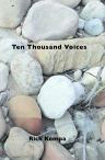July 25, 2013TEN THOUSAND VOICES
Review by John Yohe
Littoral Press
622 26th Street
Richmond, CA 94804
ISBN 978-0-9889694-0-7
2013, 80 pp., $16.00
www.littoralpress.com
I continue to think of Rick Kempa as the Poet Laureate of the American Southwest: Based in Rock Springs, Wyoming, Kempa is an avid backpacker/explorer, especially of the Grand Canyon. He’s also busy: In addition to this latest book of poetry, Ten Thousand Voices, he has an upcoming book of his own essays on hiking in the Colorado Plateau, as well as two anthologies he’s edited, one of poetry, one of essays, about the Canyon (through Vishnu Temple Press). And though Ten Thousand Voices does have poems about the Southwest and the Grand Canyon, including the great, “What the Canyon Teaches,” it also contains poems about Kempa’s travels elsewhere in America, including Vermont, and my old stomping grounds, Michigan. In fact, this book is about America, and Kempa reveals himself, not as just a regional poet, but as an American poet.
Although the general theme of the book is travel, the real subject is the people that Kempa meets and talks to along the way, their voices become the poetry, showing that voices are poetry. The best example of this, and one of my favorites of the collection, is “Invitation,” which begins:
If you come here tonight, I’ll show you everything
that shaped my day: How Megan put the tail from the pig-
roast in my hand, and Jack shouted, “Stop! Two lady-
bugs are fucking on your head!” Found a marble. Larry
said, “Work is prayer.” Women in Tibet use cow dungfor mascara. Climbed a sycamore. Sartre wrote, “Being
is doing.” Heard the first cicada drone: No thing
too big we can’t join hands around, and you will show me
what you found, if you come here. …
“Invitation” is also a good example of Kempa’s use of the prose poem, which, I feel, allows for a more casual-sounding (although that description is deceptive) language, maybe because it invites in a more story-telling/narrative style. Meaning more approachable. Meaning closer to a “spoken” voice. The human voice as poetry.
I also love the juxtaposition of the quote from Sartre with the quotes from Larry, and even Jack, all three equally meaningful bits of philosophy (should not we all pause to observe the small miracles in life, like ladybugs fucking on our heads?). At first I took this poem to be an example of how poets find the truly interesting people in life, but then I realized that Kempa is saying everyone is interesting, all ten thousand voices of us, and it just takes noticing them. That’s what a poet does best maybe, is notice, which serves as a reminder that we could too.
That said, another function of the poet is as “wiseperson” and teacher of, and for, the tribe, and Kempa’s voice has a compelling power, especially when used in a musical, chant-like way, using lists and repetition to build energy, like in another favorite of mine, “History of My Water Bottle, June 20th 1986,” in which each line is a description (one more voices!) of all the people who filled a younger hitchhiking Kempa’s water bottle on one given day. Or in the aforementioned “What the Canyon Teaches”:
… How few are your needs. Sip, nibble, nap, lack nothing.
How strong is your body, forgiving of abuses and neglect.
How simple is your task, a sequence of sure steps.
How safe you are on this earth, if you attend to it.How intricate, how lush, life is. Sit still, know its wealth.
How precious is each moment you are privileged to draw breath.